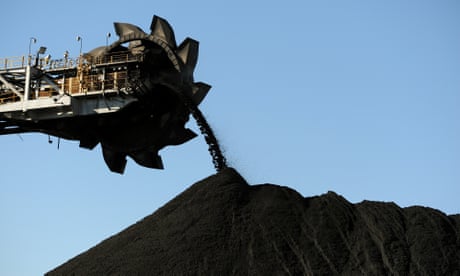- by foxnews
- 23 May 2025
Australia’s coal export boom forecast to end abruptly amid big drop in demand from China
Australia’s coal export boom forecast to end abruptly amid big drop in demand from China
- by theguardian
- 21 Apr 2022
- in news

Australia's coal export boom will come to an abrupt end because of an "imminent and substantial" drop in purchases by China, and local coal mining communities should brace for the change, the lead author of a new study says.
The peer-reviewed paper, published on Thursday in the journal Joule, forecasts China's thermal coal imports will contract at least a quarter from 2019 levels of 210m tonnes by 2025, mostly as improved transport links will give local suppliers an edge.
If China pursues more ambitious efforts to cut carbon emissions, the decline will be almost twice as fast, with imports sinking to 115m tonnes by 2025. Shipments of coking coal used in steelmaking face a similar downward trajectory, the researchers found.
The study used satellite and other data sources to compile a more detailed picture of individual power and steel plant coal demand. It also analysed how new transport links have expanded supplies from inland Chinese provinces and Mongolia to coastal users, supplanting Australian and Indonesian exporters.
"This was actually somewhat of a surprising outcome for us," said Jorrit Gosens, a researcher at the Australian National University's Crawford School of Public Policy and the report's lead author.
"China reducing imports of thermal coal and coking coal by roughly a quarter over the next five years, that's a major drop and not something that is far off into the future."
Gosens said that while both the prime minister, Scott Morrison, and the Labor leader, Anthony Albanese, were telling voters Australia's coal exports had decades to run, the study indicated the future was likely to be a lot less promising.
"We do hope with this [study] that folks in coal mining regions, industries and governments also look at those results and figure out that they need to be a little bit more hasty with their plans to reduce their dependency on the coal mining industry," he said.
China banned imports of coal and some other commodities from Australia in 2020 as ties between Beijing and Canberra frayed. Even without access to the Chinese market, lower orders from China would dent global demand - hurting Australian exporters - as the nation is by far the world's biggest consumer of the fuel.
China's coal consumption had been flat for the past five to eight years, and would likely start falling in the next two to three years, Gosens said.
Big investments in new infrastructure, such as the 1800km Haoji railway from China's Inner Mongolia which opened last year, would trim reliance on imports. Transport alone can account for half of the cost of the bulky fossil fuel.
While not necessarily providing good financial returns in their own right, such projects also helped to cut "dependency on volatile and politically unfriendly" sources of energy, Gosens said.
Assuming Australian shipments were permitted to resume, the study's modelling predicts Australian thermal coal exports would sink to 30-40 m tonnes in 2025, from about 50Mt in 2019. For coking or metallurgical coals, exports from Australia would drop from about 30Mt in 2019 to 20-22Mt by 2025.
Co-author and ANU professor Frank Jotzo said: "Governments and investors would be wise to consider these findings in their medium- to long-term outlook, more than the short-term gains from the current energy market volatility."
Coal exports from Newcastle reached record levels of more than $US400 ($540) a tonne earlier this year, and have lately dropped to below $US300.
"Coal will be on the way down," Jotzo said. "We need to foster alternative economic futures."
While not a target of this study, India - another great hope for Australian coal exporters - was following a similar strategy to China. It too would aim to reduce coal demand for emissions reasons but favour local producers as it did so, even if domestic supplies were of a lower quality in terms of ash or calorific content.
Australia's other major Asian markets for its coal - South Korea, Japan and Taiwan - all had plans for net-zero emissions by 2050 and would be cutting their imports "quite rapidly over the next decade", Gosens said.
Russia, meanwhile, would divert some of the coal it can no longer sell to Europe eastwards. High transport costs and limited free capacity, though, would likely see only marginal effects on Asian coal markets, he said.
- by foxnews
- descember 09, 2016
United Airlines flight returns to Hawaii after concerning message found on bathroom mirror; FBI investigating
United Airlines Flight 1169 to Los Angeles returned to Hawaii after a "potential security concern" aboard the plane. The FBI and police are investigating.
read more


